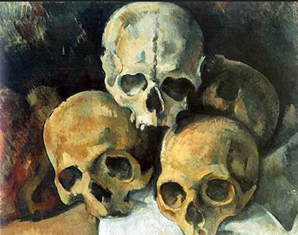
Paul Cezanne courtesy of wikimedia.org
Recently, I came upon an article that compared the habits of folks with old and new money. Old money, for example, avoided designer labels, and flashy cars and was courteous to people who provided service. New money was less shy about flaunting status and more demanding. This difference between the two groups made me wonder if each took a different attitude toward wealth in general. The best answer I could find came from a second article. It said that people with old money took pains to preserve wealth as a heritage for their heirs, more so, perhaps than those with newly minted dollars.
Next, I wondered if old money tended to lean politically to the right or left. Opinions did differ, but the consensus was that old money tended to lean to the left. Billionaires who earned their income in one lifetime, rather than through inheritance, disliked government constraints and tended to be conservative. l
Katherine Stewart, journalist, and author, has found a link between conservative billionaires and the religious far right. Though they seek different outcomes, both groups want to weaken or destroy the government’s ability to regulate certain conduct. The monied class wants to remove impediments to their bottomless quest for wealth. Religious conservatives want to establish white supremacy and end personal and civil freedom. In their pursuit of these different objectives, said Stewart, each coalition shared a tendency to cultivate an aura of sanctimony to lend legitimacy and respectability to their efforts. (“Understanding Christian Nationalism,” by Katherine Stewart, FFR, November 2024, pg. 10.) My blog, ”A Modest Proposal,” touched upon a similar point earlier.
Citizens United tilted the political landscape in the favor of billionaires when it defined money as “speech.” The interpretation allowed unlimited dollars to flow into political campaigns to influence voters. Oligarchs like Elon Musk, the world’s richest man, gained an enormous advantage over the ballot box as a result. One writer for The Atlantic said the decision debased the argument about the value of free speech and reduced the terms of the debate to the crudest possible units.
The religious right who had brought the case to the Supreme Court benefitted as well. The ruling not only allowed vast sums of money to taint our elections, but it also blurred the line between church and state and gave zealots a means by which they could imbue civic law with religious doctrine.
The oligarchs have wasted no time in flexing their new authority. Musk, for example, purchased the social platform, “Twitter,” renamed “X,” and allowed it to promulgate foreign propaganda and disinformation.
Having spent 200 million dollars to reelect Donald Trump in 2024, he struts his hour upon the stage like a coxcomb in shiny boots as Trump’s newly minted efficiency tsar. Never mind that his lucrative government contracts pose a conflict of interest in his new role.
So far, as long as the price of eggs and gas is affordable, the public shows little interest in the oligarchs who work to subvert democracy. How far will that complacency go, I wonder. Or, have we reached the point in human interaction that Robert Penn Warren once described? …there is not much need for proof that a crazy man is a large-scale menace only in a crazy society. (“The Soul of America,” by Jon Meacham, Random House Large Print edition, 2018, pg. 86.)
At the moment, I’m certain of one thing. Neither a surfeit of old or new money has a place in our politics. If “we the people” don’t drain the swamp, Trump’s inclination to make future elections unnecessary will be prophecy.
Our forefathers foresaw that our way of governing was vulnerable to threats from within rather than by a foreign invasion. Without the voter’s constant attention, money and ignorance are apt to behave like demented lovers, swearing an unbreakable vow. In the words of John Adams, democracy never lasts long. It soon wastes, exhausts, and murders itself.
Footnote: Boycott Tesla!
